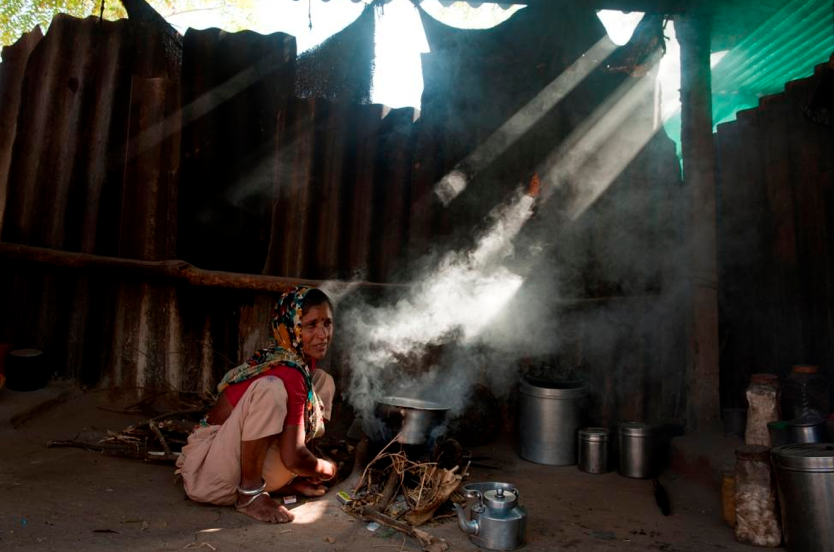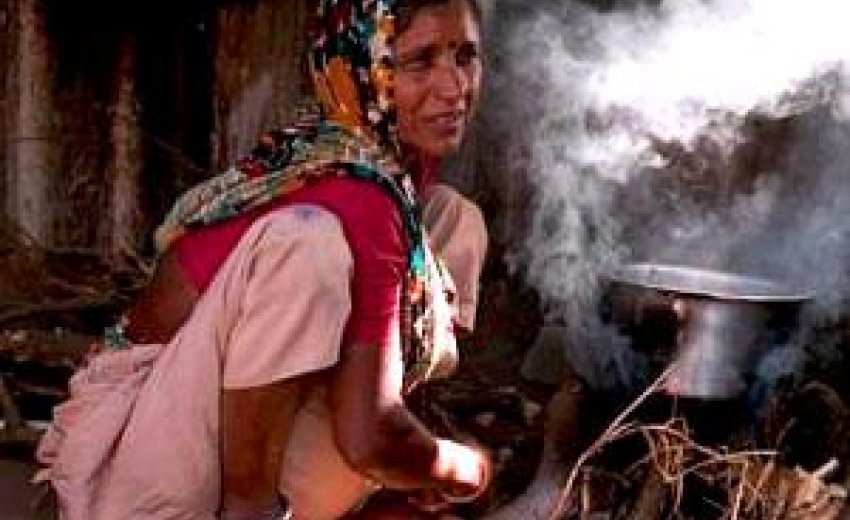
Ed note. This post is by Radha Muthiah, Executive Director of the Global Alliance for Clean Cookstoves.
I have just returned from Gujarat, a state in western India where I met with members of the Self Employed Women’s Association (SEWA), a trade union that serves the needs of poor and self-employed women, which constitute the bulk of the unprotected and unorganized labor force in India. SEWA is a movement that has more than 1.3 million members across the country.
Accompanied by SEWA staff, I visited workers in the saltpan region of Gujarat. In this desert area famous for salt production, conditions for workers are dire and strenuous. India is the world’s third-largest producer of salt after China and the US.
About 70 percent of the 19-20 million tons it produces annually comes from the western state of Gujarat. You may recall that independence leader Mahatma Gandhi rallied the people of India around the boycott of salt production, one of the largest industries in the country.
Families that earn their income through the sale of salt spend eight months of the year in the salt pans, overseeing the process of salt crystallization and working under harsh conditions, far away from their villages and sometimes their families. The workers told me that men usually come to the salt pans a couple of months earlier than their wives and children.

One of SEWA’s priorities in this region is to increase access to clean and efficient cookstoves through their network of self-employed women. In this barren area there are no trees, making fuel collection a real challenge. Families usually bring stacks of wood from their villages, which they use for cooking on open fires or inefficient stoves.
What really struck me here is the level of awareness among salt pan workers about clean and efficient cookstoves. At least half of SEWA’s members in the salt pan region we visited are not only keen on purchasing high quality cookstoves but are also ready to put a 200 Rupees (US$ 4.50) down payment toward one.
Both women and men see the immediate savings to be gained in terms of spending significantly less money on fuel. Their current on average need for 5kg (11 lbs) of wood per week would be halved with a fuel efficient stove. They also see that food cooks much faster on a higher quality stove. A meal that used to be cooked in three hours can potentially be cooked in one. I got a glimpse of this when a family with a clean cookstove made tea for us. The water boiled really fast, almost like with a gas stove.
I was astonished about the number of men who directly benefit from clean cookstoves. It was simply amazing. Since men arrive at the salt pans a few months earlier than their families, they have to cook for themselves. They immediately see the benefits of a fuel efficient cookstove as it cooks faster, enables them to cook multiple things, and saves them time. Because they cook indoor, they also appreciate the reduced smoke.
The greatest challenge here is that, despite the level of awareness among salt pan workers on the benefits of using clean cookstoves, there is not enough supply of high quality stoves. Though some stoves are widely available, they produce excessive ash or frequently burn pots and pans. What are missing are high quality stoves that meet the cooking needs of local families.
Interestingly, most people I spoke with are interested in bundling energy sources. They want to invest in a solar panel, a solar light and a clean and fuel efficient cookstove. The bundle costs about 4,500 Rupees, the equivalent of US$ 100. Most prefer to buy the bundle even though it is expensive. Though one product may be the motivator for another, they see the value in investing in all three at once.
SEWA facilitates the selling of the high quality stoves to many different communities in Gujarat but the workers in the salt pans are a priority target because of the living conditions they endure. Demand is high and the challenge is to find a manufacturer that can produce high quality stoves at the scale that is needed.
So what could the Global Alliance for Clean Cookstoves do for SEWA and the women they serve? All the women we spoke with told us that they want manufacturers to scale up production of high quality stoves in this area. The Alliance could provide technical assistance to SEWA, facilitate meetings with different manufacturers, broker consumer financing and share lessons learned worldwide.
While all of this is part of an ongoing conversation, one sure thing is that lack of demand is not an issue in this population. On the contrary, their interest in bundling sources of energy, speaks to their investment foresight and smart planning.
PHOTO CREDITS / Manpreet Romano

